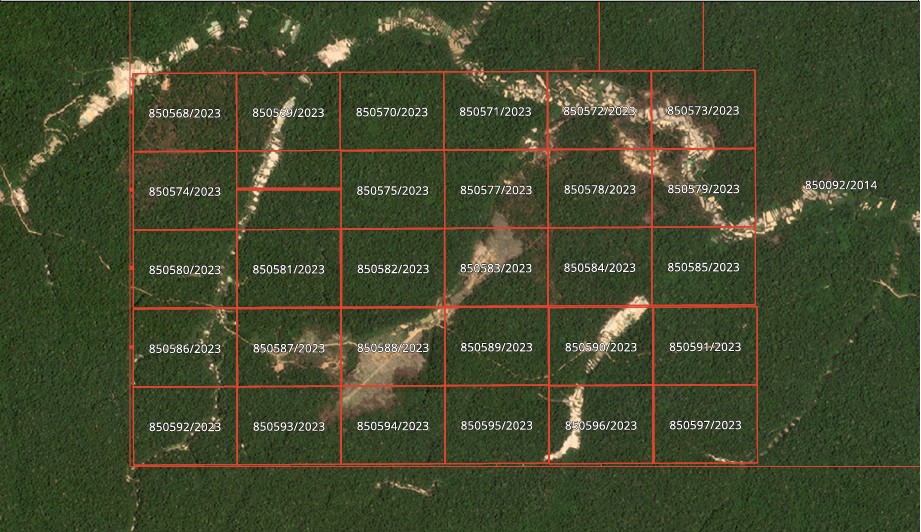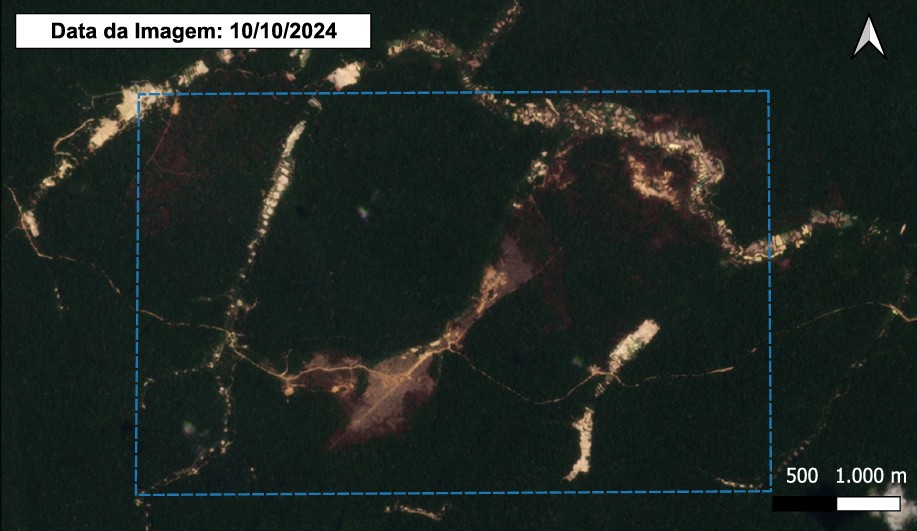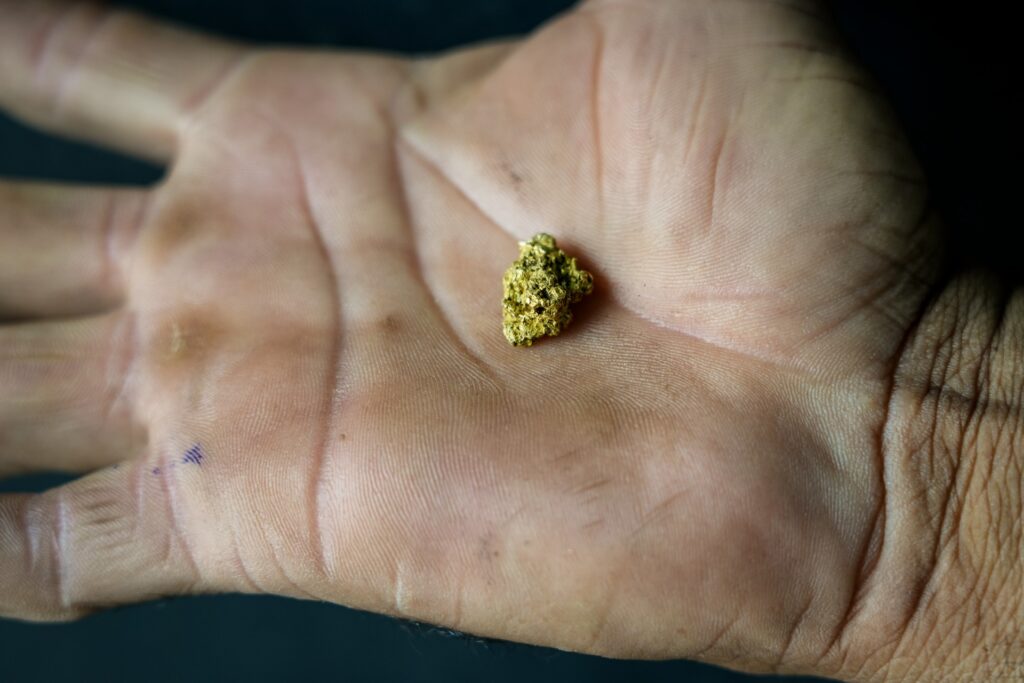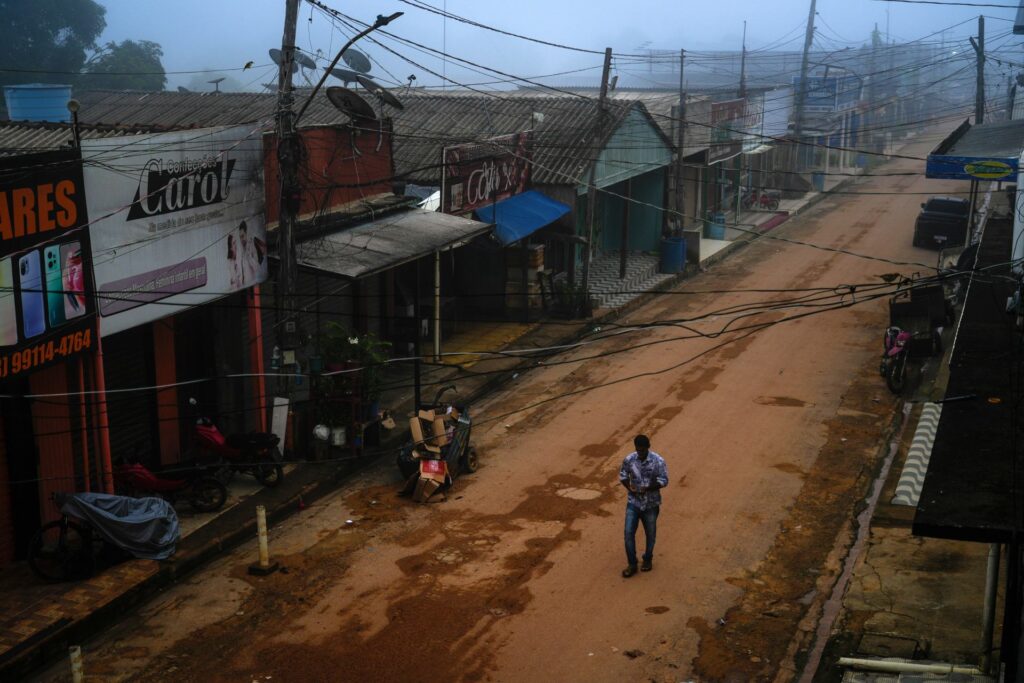A NEW RULE FROM from the government of Pará has made it easier to grant environmental licenses for gold mining in the state’s Amazon region. In September 2024, a change in a Coema (State Environmental Council) resolution shifted the responsibility for licensing mining operations of up to 50 hectares from the state to local municipalities. According to experts consulted by Repórter Brasil, this move weakens the requirements for miners and has contributed to deforestation and contamination of rivers in the Tapajós Environmental Protection Area (APA Tapajós), located in Itaituba, in southwestern Pará.
The APA Tapajós is the most invaded Conservation Unit by miners in Brazil, according to the historical data of the Mapbiomas platform, which tracks destruction between 1985 and 2022. In that period, 51,600 hectares were taken over by mining.
The rule in Pará was introduced to simplify the licensing of mining activities with local environmental impact. However, the environmental permits for mining granted by municipalities are “basically just a piece of paper, without any enforceable conditions,” says Lincoln Michalski, ICMBio (Chico Mendes Institute for Biodiversity Conservation) coordinator in the APA Tapajós. ICMBio is responsible for the management of Conservation Units in Brazil.
“We’ve found many inconsistencies and poor quality in the issuance of these documents. It’s an extremely concerning situation, causing great environmental degradation without any area recovery, without recovery plans,” he adds.
In addition to underestimating the environmental impacts, there are signs that this licensing model allows the approval of large mining projects fragmented into small adjacent areas.
Fragmentation of mining operations
Repórter Brasil identified active mining sites within the APA where the licenses meet the municipal licensing criteria.
Previously, the area was registered with the ANM (National Mining Agency) under the name of Valdinei Mauro de Souza, known in the region as Nei Garimpeiro. The businessman, who owns three mining companies, was targeted by a federal police search and seizure operation in 2022 as part of an investigation into mercury smuggling for illegal mining operations.
In August 2023, Valdinei de Souza submitted requests to the ANM to fragment the 4,000-hectare mining polygon into three areas, transferring the land’s use rights to three individuals: Alfredo Ens, Cleber Benedito Arruda Rosa, and Nilton Rodrigues Ferreira.

The fragmentation resulted in 29 mining requests of 50 hectares each. This size allowed the areas to be classified under the Coema resolution, and thus eligible for licensing by the Itaituba municipal government. All 29 environmental licenses were submitted to ANM in September 2024, the same month the rule was changed.
ICMBio questions legality
Satellite images analyzed by ICMBio at the request of Repórter Brasil show the advance of mining activities in the 29 fragmented areas. According to environmental agency staff, the scars in the native vegetation are consistent with the use of hydraulic excavators, which increase the productivity of the mining operation.

The areas are located south of the APA Tapajós, where mining is only allowed with ICMBio’s authorization, as the agency manages the conservation unit. Lincoln Michalski, operations coordinator at ICMBio in the region, denied that the agency allowed mining in the 29 fragmented areas.
The mining sites identified by Repórter Brasil’s investigation are still under analysis and have not been granted a final permit by the ANM. After the case was presented, ICMBio told Repórter Brasil that it would include the area on its list of priority targets for its operation against illegal mining in the APA Tapajós.
At the end of November, Repórter Brasil visited the Itaituba city hall and attempted to contact the mayor and the Secretary of Environment and Mining, Bruno Rolim, but they were unavailable. Officials provided an email for sending questions, but the email was not responded to by the time of the publication of the report.
Repórter Brasil also attempted to contact Valdinei Mauro de Souza through his lawyer and company, but received no response before the article’s completion. The report was unable to locate Alfredo Ens, Cleber Benedito Arruda Rosa, and Nilton Rodrigues Ferreira.
The Coema was contacted but did not respond to the questions sent. The Secretary of Environment and Sustainability of Pará (Semas-PA), which manages the council, was also contacted for comment on the case and the criticisms of the resolution, but did not reply before the publication of this report.
The space remains open for future statements.
Pará ignores recommendation
Like ICMBio, the Federal Public Prosecutor’s Office (MPF) has already pointed out the impracticality of granting municipal mining licenses, particularly in the APA Tapajós. Both agencies believe the state resolution conflicts with environmental law by disregarding the socio-environmental impacts of mining.
The main argument is that mining impacts extend beyond municipal borders, as sediments and toxins used in the activity spread throughout river systems.

In February 2023, the MPF issued a recommendation to the Pará Executive, highlighting the weakness of municipal administrative structures. The agency argued that the Coema resolution violated Complementary Law No. 140/2011, which defines environmental competencies for federal, state, and municipal governments, and ignored the high pollution potential of mining.
In response to the MPF, Coema created a Technical Chamber to draft guidelines for mining licensing in the state. In September 2024, it modified—but did not revoke—the resolution, reducing the minimum area subject to municipal licensing from 500 to 50 hectares.
‘We’ve Never Monitored’ said Mayor
In early 2022, Valmir Climaco, mayor of Itaituba, stated in an interview that he had granted more than 500 mining licenses. “And we’ve never monitored,” he added, in an interview with the newspaper O Globo. At the time, the mayor promised to suspend the licenses and only approve mining operations with the approval of ICMBio and MPF.
In the past week, the Brazilian Enrivonmental Agency (Ibama) suspended 331 Mining Operation Permits in the APA Tapajós. The environmental agency found the PLGs were in violation of environmental regulations. Among the infractions were the indiscriminate use of mercury and the dumping of sediments into rivers.
Analysis at the Supreme Court
In December 2023, the Green Party (PV) filed a lawsuit with the Supreme Federal Court (STF), challenging the constitutionality of the Coema resolution. The PV is asking the STF to suspend the resolution’s effects and require Pará to correct the environmental damage caused by the rule. The lawsuit is still under review by the court, with no date set for a decision.

The party emphasizes that Pará is the only state in the Amazon Legal region to delegate this responsibility to municipalities, which has contributed to the growth of illegal mining.
Federal and state responsibilities
The Socioenvironmental Institute (ISA) and WWF-Brazil have also opposed municipal mining licensing in Pará. In a technical note, the organizations highlighted the institutional incapacity of municipalities to carry out licensing and monitoring of mining activities. The document mentions Itaituba, where the mayor himself admits granting licenses without proper oversight.
“The impact of mining extends beyond municipal limits, especially when considering the dispersal pattern of sediments and toxic substances used in mining, such as mercury,” explains Ariene Cerqueira, Public Policy Analyst at WWF-Brazil.
The organizations argue that the responsibility for licensing mining should rest with the state or federal government, depending on the scale of the impacts.

